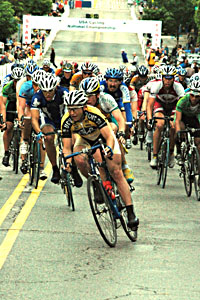Medical student, who gives new meaning to ‘multidisciplinary,’ wins 2005 Collegiate Road Cycling National Championship
By Lucy BiedermanMedical Center Public Affairs
 Todd Yezefski takes the lead and maintains it to the finish line. Yezefski is the winner of the Collegiate Road Cycling National Championship and rides for Team TIAA-CREF. | |
To win the 2005 Collegiate Road Cycling National Championship on Friday, May 13, Todd Yezefski, a first-year Ph.D. candidate in the cancer biology program, had to overcome fierce competition from his fellow riders—and foul weather. But Yezefski, who moved to Chicago this past fall, has learned by now to be a good sport about rain and snow.
“The course was pretty wide open, so the rain didn’t affect the race very much,” Yezefski said. Though perhaps the perspiration affected Yezefski’s vision: “I didn’t know I’d won until I crossed the finish line and looked at my competitors,” he said. “They gave me the nod, and only then did I realize I had done it.”
Finishing first in the 70-minute criterium, which took place in Lawrence, Kan., has been a long-held goal for Yezefski, who started cycling when he was 14 years old.
“This particular race favors riders who are good sprinters, and I’ve always been a good sprinter,” said Yezefski, who rides for Team TIAA-CREF. “So for the past five years, winning this race has been my goal. I had gotten really close to winning before, but I could never quite do it, until now.” The 23-year-old competed against 68 other student-athletes from 42 Division II programs.
Since beginning his studies at Chicago, Yezefski has given new meaning to the term “multidisciplinary”—combining 20 hours a week of cycling with the rigorous lab work and study that his program requires.
A typical day for Yezefski involves waking up at about 5:30 a.m., getting on his bike by 6:30, riding for two to five hours, then either going to class or to the lab. He spends the rest of the day studying or finishing extra lab work.
Much of Yezefski’s inspiration for both his cancer biology studies and cycling comes from his memories of his cycling coach, friend and mentor Alaric Gayfer, who died of cancer last year. “I knew from the beginning that I wanted to do something more clinically involved than basic science,” he said. “Seeing my coach struggle pushed me into cancer research.”
And although Yezefski knows he wants to be involved in cancer biology after he graduates, he is not sure yet in what capacity. “I’m pretty open at this point,” he said. “I could see myself working in an academic environment or in industry.”
Yezefski got offers from graduate schools in more bike-friendly climates, but he ultimately chose Chicago for its top-notch faculty and research facilities. “It’s a great school,” he said. “The community of professors and students is really special here. The professors are great about looking out for the students.” Yezefski also appreciates the University’s location. “Being in a big city, but set a little bit apart from it, is a nice situation.” He added that Hyde Park’s easy access to the lakefront bicycle path has proved useful.
Cementing his decision to come to Chicago was Yezefski’s plan to quit cycling once he got to graduate school. Yezefski, a 10-time national champion, switched from track racing to road racing while he was an undergraduate at Dartmouth College. At Dartmouth he won several local and collegiate races, but he found himself steadily losing interest in the sport. An injury in the fall of his senior year added to his sense that it was time to quit racing and start focusing on his academic future.
That spring, at the Collegiate Nationals, Yezefski secured a key finish that placed him on Team TIAA-CREF. Racing with his new teammates over the next several months gave Yezefski the encouragement and confidence he needed to stay in the race. When he arrived at Chicago this fall to embark on his cancer biology career, he was still, to his own surprise, a committed cyclist.
Despite his busy schedule, his position at the top of the cycling ladder means he probably will not be quitting anytime soon. “I plan to keep on doing it as long as it doesn’t interfere with my school work,” he said. “I’ll keep doing both for as long as I can.”
As for Chicago’s cycling conditions, Yezefski has had to adjust. He often rides with the University’s cycling team. “We meet in the early mornings so we can get out on the lakefront path before it gets busy,” he said.
“I’ve definitely lived in places that are better for riding, but you just have to be a little more disciplined here, and be ready to deal with traffic, people running and Rollerblading on the bike paths, and the weather.” And despite the city’s less-than-ideal weather, there is, he said, “a pretty big cycling community all around the Chicago area.”
Because he has now accomplished his cycling goal, that does not mean he will be staying inside and resting. “The Elite National Criterium Championships are being held in August,” Yezefski said. “My next goal for the season is winning them.”
![[Chronicle]](/images/sidebar_header_oct06.gif)